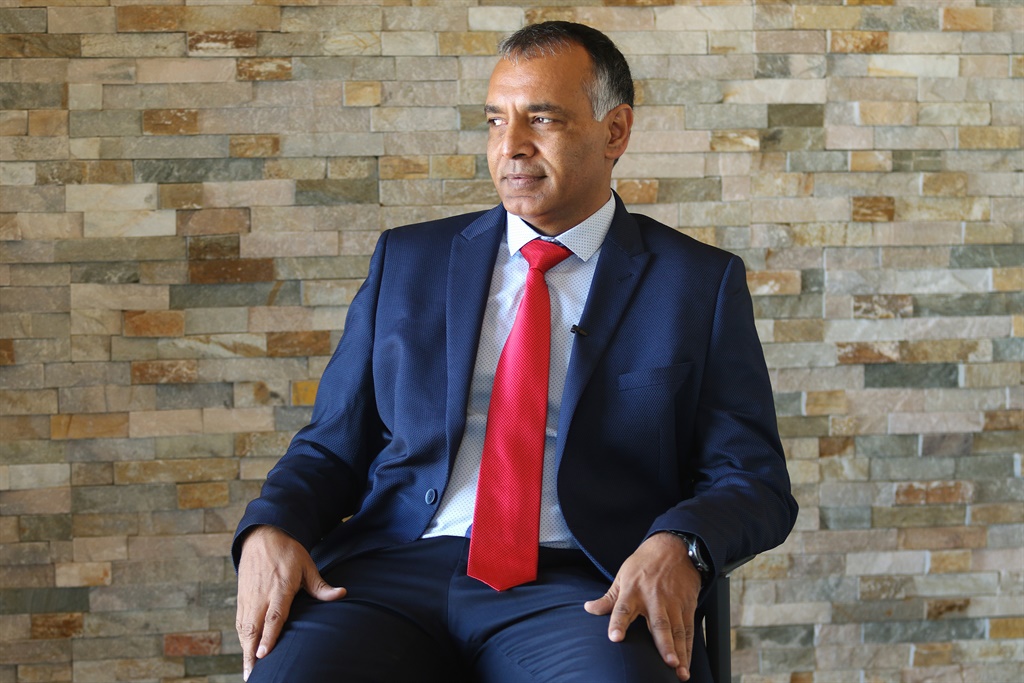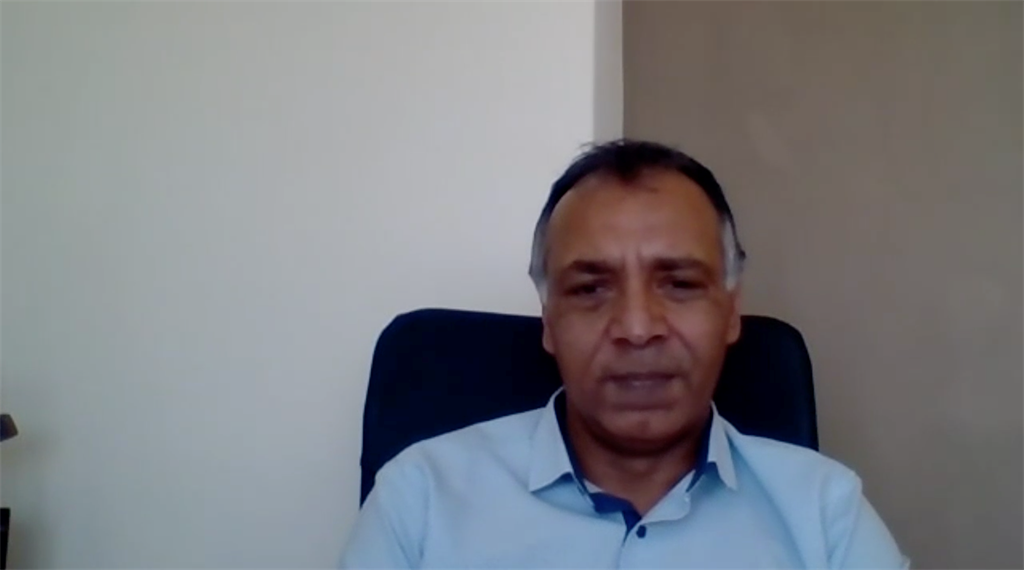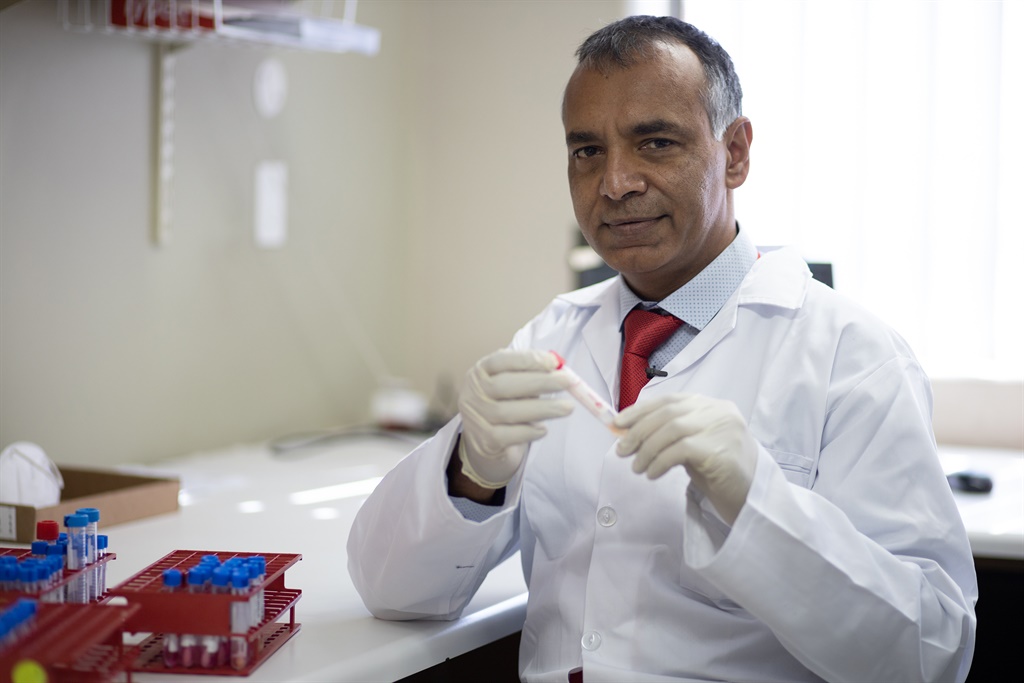


Professor Shabir Madhi.
South Africa‘s Covid-19 vaccine trial lead researcher, Professor Shabir Madhi, believes South Africans should only expect a return to normal by 2022, he can make a bigger impact outside of the Ministerial Advisory Committee, and the health department has fared “reasonably well” dealing with the pandemic.
Professor Shabir Madhi, the man leading the University of Oxford’s Covid-19 vaccine trial in South Africa – considered to be a global front runner – is tired.
For the past four months, Madhi has been on the frontlines battling the invisible enemy, conducting clinical trials under unparalleled circumstances.
He has also been in the trenches alongside his colleagues on the Ministerial Advisory Council (MAC) guiding the country‘s war-like effort against the coronavirus.
And he thinks it might be time to focus his energy elsewhere.
“I’m definitely able to contribute much more by engaging directly with the public on issues which they would raise with me, be it with the media or be it through opinion pieces, than the impact that I’m having on the ministerial committee,” a visibly tired Madhi said.
Members of the Department of Health’s MAC have in the past few months often publicly disagreed with the government’s Covid-19 response, among others, criticising “unscientific” regulations around retail sales.
One of the areas Madhi, a father of two, strongly disagrees with is the state’s decision to close schools and allowing 100% taxi occupancy which “from a scientific perspective is the last thing you want to do”.
He says:
I believe it’s absolutely essential that all children need to be in school because, this is not a problem that is going to disappear in the next two to three months.
“If anything, what we see among teachers is, for example, their risk of infection is no greater than the risk of infection in the community.”
The government did not completely ignore the committee’s recommendations, Madhi said, but the state should make policy decisions not only on the scientific evidence presented, but also on the social and political realities presented.



Professor Shabir Madhi.
Supplied: Wits University
He does, however, believe it is “absolutely essential” MAC advisories be made public so people have the “latest knowledge of the pandemic”.
Dean of Faculty
Madhi was speaking to News24 in a virtual interview from his office at the South African Medical and Research Council’s Vaccine and Infectious Diseases Analytics Research Unit at the University of Witwatersrand.
Not only does he lead the unit, but the paediatrics doctorate graduate is also set to become the dean of the Faculty of Health Sciences at the university in January 2021.
The 53-year-old (but “feels like 63”) wakes up every day at 06:00 before he makes his way to the unit, where he spends more than 14 hours a day leading an effort to save the lives of ordinary South Africans.
He says:
See, if I managed to get up at six, then I can at least get half an hour of training time in or else I end up limited to my desk the entire a day doing nothing else.
In the evenings, Madhi attends international webinars around the latest research on the coronavirus, and then turns to read research papers before heading to bed.
Madhi says:
You can’t allow yourself not to be up to date with what is happening.
Together with his personal assistant, he also runs a gruelling media engagement schedule to encourage behavioural change among South Africans.
Dressed in a crisp light blue shirt, Madhi said: “I am trying to cope, but I think that exhaustion is setting in very rapidly.
“It’s probably been the most intense in terms of my work compared to what I’ve experienced in the past 24 years.”
Madhi does not want to speculate when South Africans should expect relaxed lockdown measures or the unbanning of cigarette and alcohol sales, which he said was a political decision, adding he disagreed with the prohibition on sales.
He says:
These discussions are obviously under confidentiality in the MAC.
He believes the South Africa government and the Department of Health have fared “reasonably well” with its response to Covid-19.
“I think there are issues around some in terms of openness when it comes to some of the data, which is not helpful not to make that publicly available, especially to scientists because they need to be guided in the decision-making by having access to data.”
The Western Cape, Madhi said, was the best example of a province which used the lockdown effectively to prepare its facilities for the upcoming peak, while the Eastern Cape had seen a “complete collapse of governance” in its healthcare sector.
He says:
It’s premature to score other provinces. It’s only after the peak as arrive there that you’ll be able to make an adequate assessment as to how they fared.
He is, however, not “too optimistic” the pandemic will help to change the government’s approach to health care.
“And the reason for that is that we faced another pandemic in 2009, which fortunately was with a much less virulent virus, and and soon thereafter, there was a lot of talk about how we need to improve our healthcare systems to sort of mitigate the effects of a future pandemic. And 10 years later, we pretty much didn’t make much progress.
Madhi says:
Unfortunately, when it comes to politicians, they’ve got a short-term view of life.
“And what the type of things that we’re talking about requires generations to basically re-engineer health care. We are not going to re-engineer it with three months of a lockdown.”
Clinical trials
Madhi convinced the University of Oxford at the end of March to conduct clinical trials of their Covid-19 vaccine in South Africa after he personally reached out to one of its principal investigators.
When he managed to secure funding from the Bill and Melinda Gates Foundation, which he has worked with in the past, clinical trials of the vaccine started South Africa, and the first results are expected by the end of November.



Prof Shabir Madhi during his interview with News24.
But, unfortunately, Madhi does not expect a vaccine to be ready before 2021.
He says:
It’s unlikely that we will see vaccine in South Africa before the third quarter of next year. And that is if the vaccine works. So, it’s quite a long way to go.
He said there were currently 27 vaccines on trial, but “90% of vaccines that go to human studies don’t work”.
And even if the world manages to develop a vaccine by 2021, Madhi said a sense of normality would only return “by 2022 at least”.
“I think the reality is that there’s not going to be billions of doses of vaccine that’s going to become available overnight.”
He says:
So, there’s going to be limited supply of vaccine. And it’s going to need to be some prioritisation in terms of who gets vaccinated.
A typical clinical trial costs around R250 million to R300 million, but Madhi said they were “doing it on the cheap” at R170 million.
He added the South African clinical trial, the smallest of three clinical trials taking place which is also taking place in the UK and Brazil, would be able to show the same results as elsewhere.
“So, the difference between the UK and South Africa at the moment, for example, is that the UK is very much sort of at the tail end of this particular wave of outbreaks.
“So, the participants involved in those studies are not as exposed and not exposed to the same extent to the virus as participants in South Africa, where we saw an upward trajectory in terms of this wave of the outbreak.
“So, because of that, we expect South African participants, unfortunately, to be much more exposed to the virus and to be more likely to develop Covid-19 and because of that, we can do a study with a smaller number of individuals.”
Only once a large number of those individuals vaccinated is naturally infected with the virus in South Africa, which is expected around the end of November, researchers will be able to determine whether it protects against Covid-19.
He says:
I am cautiously optimistic. I think the immunogenicity data is very favourable. So that’s a cause for optimism but at the same time, we’ve been there in the past.
“So right now, the problem with Covid-19 is we don’t actually understand exactly how much antibodies, as an example, you need to protect against Covid-19. So, we know that the vaccine produces antibodies as an example, but we don’t know how much antibodies are required.”
Madhi said clinical trials of a second Covid-19 vaccine from a private company he had reached out to was hopefully going to start in South Africa by August.
He says:
I can’t mention the name of the company until it’s approved by regulatory authorities.
He added it usually took between five to 20 years for a vaccine to be developed, and it would, therefore, be “unprecedented” to have a vaccine developed by next year.
“Why that might be possible is because we’re doing a lot of steps in parallel rather than in a series.”
One of these steps taking place in parallel is that international pharmaceutical companies such as AstraZeneca, in the case of the Oxford University vaccine, is already building manufacturing capability despite the efficacy of the vaccine not yet proven.
He says:
And they almost already producing vaccine even before having an answer as to whether that vaccine is going to work or not.
Burnout
Madhi said there was only been one weekend he had not worked the past four months when he was “too exhausted”.
But, he is more concerned about his more than 300 staff at the Vaccine and Infectious Diseases Analytics Research Unit who has been working 14-hour days seven days a week compared to their typical eight-hour days before the pandemic.
He said research on pre-Covid-19 projects such as vaccines for pregnant mothers to prevent child fatality continued, while Covid-19-related studies have just been added to the workload.
The laboratory, for example, which usually operates from 08:00 to 16:00 Monday to Fridays, now operates from 07:00 to 21:00 the entire week.
Some staff has been forced to take leave due to burnout, while others have fallen ill from Covid-19.
“It’s definitely not sustainable,” a weary Madhi said, staring into the distance. “But unfortunately, I can’t see any end in sight in the near future.
He adds:
I think we’re probably going to continue at this rate to these through to the end of 2020.
“And hopefully, there’s some intervention that it comes into being, possibly a vaccine, that can assist us in terms of gaining some control over this pandemic.”
Accidental scientist
Madhi grew up in Lenasia, Johannesburg, and completed his undergraduate and post-graduate training at the University of the Witwatersrand and qualified as a paediatrician in 1996.
He has since co-authored more than 400 scientific publications.
Madhi says:
I’m sort of what I would consider to be an accidental scientist: medicine was never my passion. And it’s certainly not the career that I wanted to embark on.
“But because of circumstances, I ended up doing medicine and the opportunity arrived being involved in a vaccine study, with having very little past experience in research. So that was certainly a privilege and my introduction to the world of research and science.”



Professor Shabir Madhi.
SuppliedSupplied : Wits University
His research has been pivotal in the World Health Organisation recommending the pneumococcal conjugate vaccine, rotavirus vaccine and influenza vaccination for pregnant women which he said had helped to prevent up to 1.2 million child fatalities over the past few years.
“What drives me is knowing that we have made a difference in the past through the research that we’ve done, we’ve made a difference in terms of preventing children from dying from what were the leading causes of pneumonia.”
Madhi says:
The only reason why fewer children in low to middle-income countries die from pneumonia was because of the research that was undertaken at my research unit.
Miscalculation
Four years ago, he stepped back as director of the National Institute for Communicable Diseases (NICD) to “start taking it easier” by dedicating his time at the vaccine research unit, “thinking that it would be semi-retirement”.
He says:
And that obviously has been a miscalculation. But whether, I mean, it’s impossible for me to sort of pull back at the stage.
“South Africa’s got an opportunity to do what very few other African countries can do in terms of sort of figuring out how best to manage Covid-19 on the African continent because of the legacy of our research institutions that puts us in a very favourable position.”
Madhi hoped his legacy would be to make a contribution to saving the lives of adults and children.
“I hope me and my research unit are part of the piece of the puzzle rather than the totality in finding a vaccine for Covid-19, and help save the lives of many,” he said at the end of the interview, before excusing himself.
The researcher then rushed back to laboratory to join his colleagues on the frontlines.
The battle continues.
Next on News24
FIRST TAKE | Ramaphosa evades another opportunity to lead as he caves in to unions
23 Jul





